专题02 动词 & 情态动词(课件+2023年真题研析·规律探寻)-2024年中考英语二轮复习讲练测(全国通用)
文档属性
| 名称 | 专题02 动词 & 情态动词(课件+2023年真题研析·规律探寻)-2024年中考英语二轮复习讲练测(全国通用) |

|
|
| 格式 | pptx | ||
| 文件大小 | 4.7MB | ||
| 资源类型 | 试卷 | ||
| 版本资源 | 通用版 | ||
| 科目 | 英语 | ||
| 更新时间 | 2024-03-14 09:42:21 | ||
图片预览

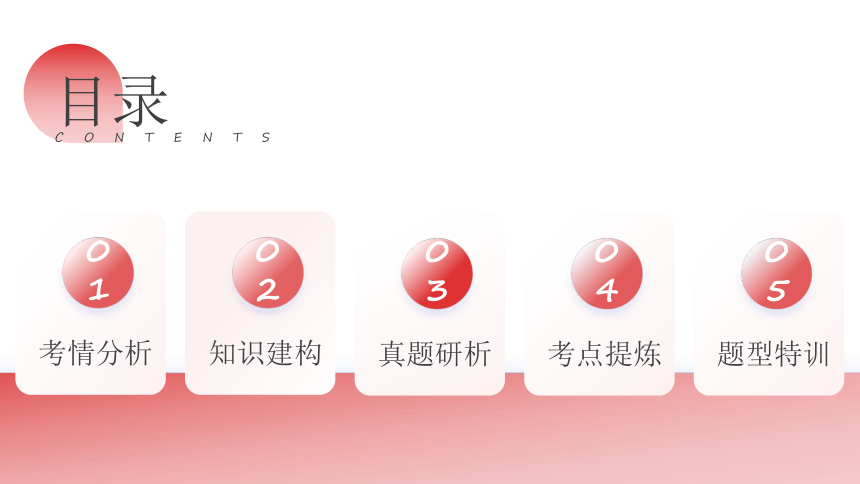
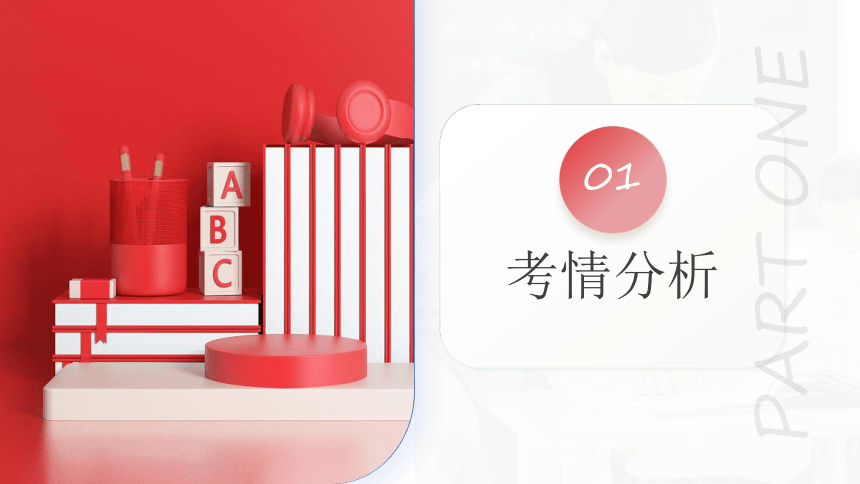
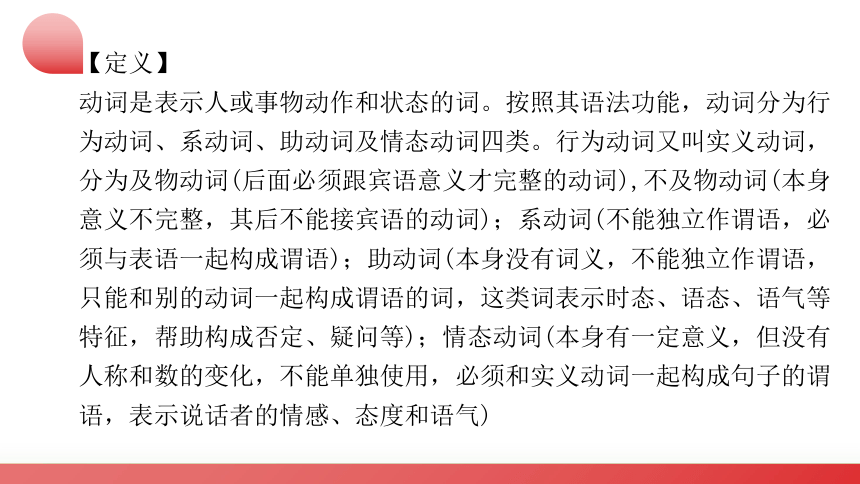

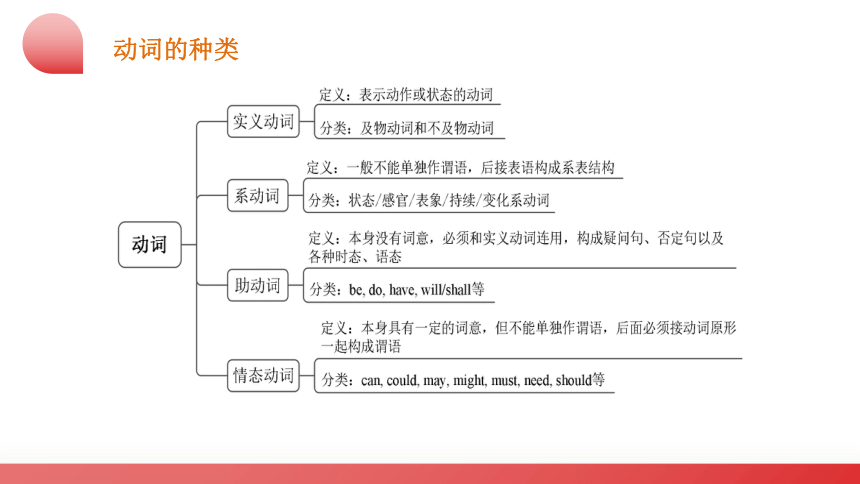
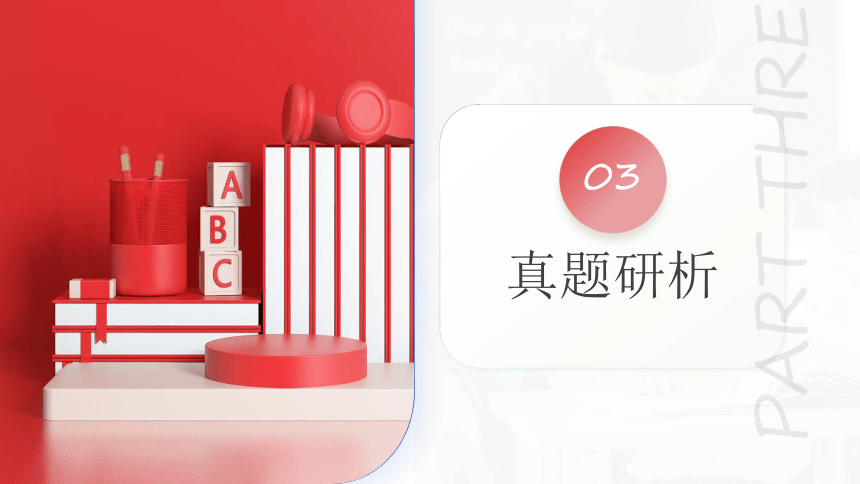
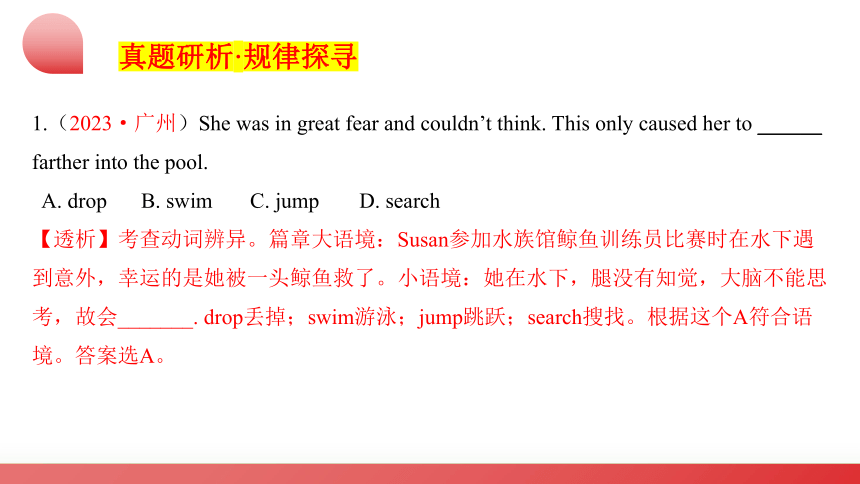
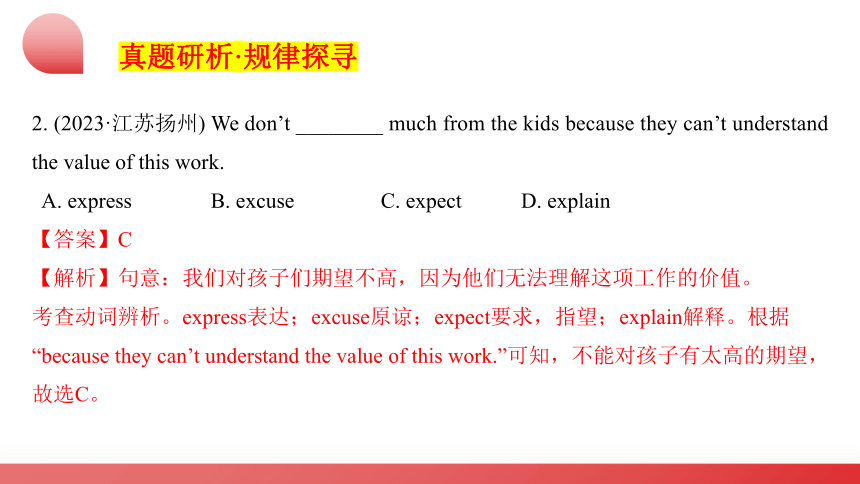
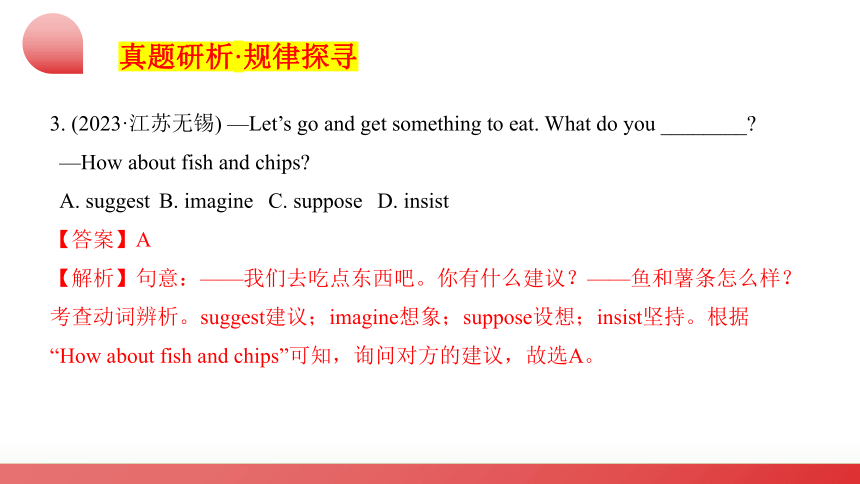
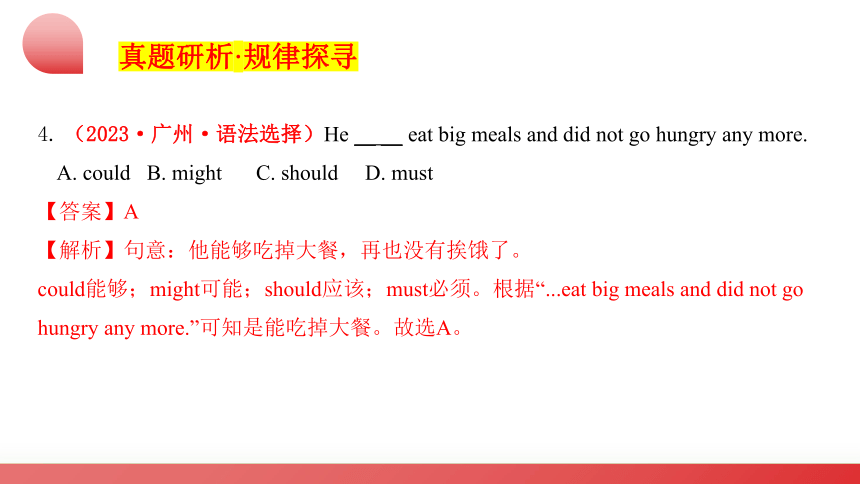
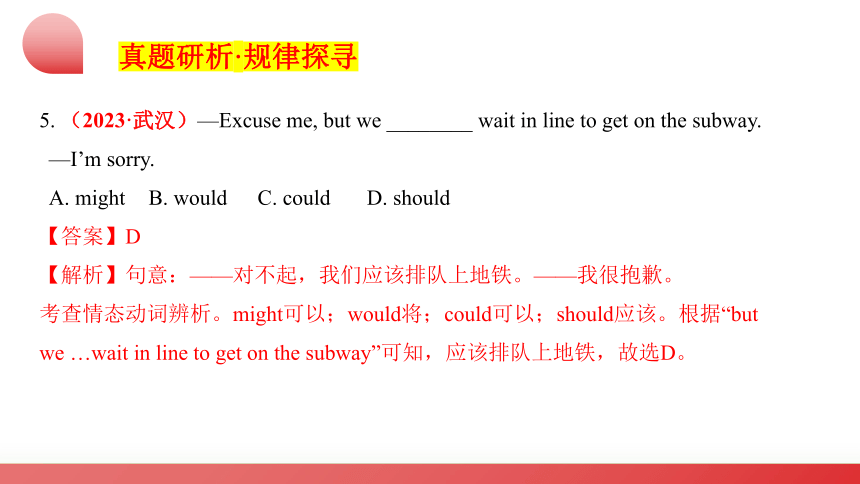
文档简介
(共32张PPT)
导师:稻壳儿
二轮复习讲练测
第二讲:动词,情态动词
01
考情分析
02
知识建构
03
真题研析
04
考点提炼
目录
CONTENTS
05
题型特训
01
考情分析
PART ONE
【定义】
动词是表示人或事物动作和状态的词。按照其语法功能,动词分为行为动词、系动词、助动词及情态动词四类。行为动词又叫实义动词,分为及物动词(后面必须跟宾语意义才完整的动词),不及物动词(本身意义不完整,其后不能接宾语的动词);系动词(不能独立作谓语,必须与表语一起构成谓语);助动词(本身没有词义,不能独立作谓语,只能和别的动词一起构成谓语的词,这类词表示时态、语态、语气等特征,帮助构成否定、疑问等);情态动词(本身有一定意义,但没有人称和数的变化,不能单独使用,必须和实义动词一起构成句子的谓语,表示说话者的情感、态度和语气)
02
知识构建
PART TWO
动词的种类
03
真题研析
PART THREE
真题研析·规律探寻
1.(2023·广州)She was in great fear and couldn’t think. This only caused her to ______ farther into the pool.
A. drop B. swim C. jump D. search
【透析】考查动词辨异。篇章大语境:Susan参加水族馆鲸鱼训练员比赛时在水下遇到意外,幸运的是她被一头鲸鱼救了。小语境:她在水下,腿没有知觉,大脑不能思考,故会_______. drop丢掉;swim游泳;jump跳跃;search搜找。根据这个A符合语境。答案选A。
真题研析·规律探寻
2. (2023·江苏扬州) We don’t ________ much from the kids because they can’t understand the value of this work.
A. express B. excuse C. expect D. explain
【答案】C
【解析】句意:我们对孩子们期望不高,因为他们无法理解这项工作的价值。
考查动词辨析。express表达;excuse原谅;expect要求,指望;explain解释。根据“because they can’t understand the value of this work.”可知,不能对孩子有太高的期望,故选C。
真题研析·规律探寻
3. (2023·江苏无锡) —Let’s go and get something to eat. What do you ________
—How about fish and chips
A. suggest B. imagine C. suppose D. insist
【答案】A
【解析】句意:——我们去吃点东西吧。你有什么建议?——鱼和薯条怎么样?
考查动词辨析。suggest建议;imagine想象;suppose设想;insist坚持。根据“How about fish and chips”可知,询问对方的建议,故选A。
真题研析·规律探寻
4. (2023·广州·语法选择)He __ __ eat big meals and did not go hungry any more.
A. could B. might C. should D. must
【答案】A
【解析】句意:他能够吃掉大餐,再也没有挨饿了。
could能够;might可能;should应该;must必须。根据“...eat big meals and did not go hungry any more.”可知是能吃掉大餐。故选A。
真题研析·规律探寻
5. (2023·武汉)—Excuse me, but we ________ wait in line to get on the subway.
—I’m sorry.
A. might B. would C. could D. should
【答案】D
【解析】句意:——对不起,我们应该排队上地铁。——我很抱歉。
考查情态动词辨析。might可以;would将;could可以;should应该。根据“but we …wait in line to get on the subway”可知,应该排队上地铁,故选D。
用法 示例
及物动词 (1)带一个宾语 If you have any questions, you can raise your hands.
你们如果有问题,可以举手。
(2)带双宾语(间接宾语+直接宾语) 间接宾语常指人,直接宾语常指物
My parents gave me a nice gift on my birthday.
我的父母在我生日那天给了我一份精美的礼物。
(= My parents gave a nice gift to me on my birthday.)
I will buy you a new dictionary. 我会给你买一本新词典。
(= I will buy a new dictionary for you.)
(3)带复合宾语(宾语+宾语补足语) Please keep the door open. 请开着门。
Our teachers tell us to study hard. 老师告诉我们要努力学习。
不及物动词 (1)不带宾语 They are running on the playground. 他们正在运动场上跑步。
(2)后加介词+宾语 Please look at the blackboard and listen to me. 请看黑板,听我说
实义动词按其后是否需要接宾语,可分为及物动词和不及物动词。
实义动词
动词辨异!
在实义动词中,中考考题主要考查动词用法的辨异,经常出现在单项选择和完形填空中,是中考一大重要考点。
常用种类 例 词 例 句
状态系动词 be 是 Tom was tall and thin. 汤姆又高又瘦。
The book is very interesting. 这本书很有趣。
感官系动词 feel感觉;摸起来 look看起来 smell 闻起来 taste 尝起来 sound 听起来 I often feel tired after work. 我下班后经常感觉疲惫。
The tomatoes feel very soft. 这些西红柿摸起来很软。
Jack is sick. He looks pale.
杰克病了,他看起来脸色苍白。
Durian smells bad but tastes good. 榴莲闻着臭但吃着香
This song sounds wonderful. 这首歌真好听。
系动词
(1)用法:构成句型“主语+系动词+表语”,表语修饰主语,描述主语的特征或状态。其中以形容词作表语最为常见。
(2)种类:
表象系动词 seem, appear 似乎;看起来像 The teacher seemed (to be) really angry.
那位老师似乎十分生气。
She didn’t appear (to be) surprised at the news.
她听到这个消息时没有显得吃惊。
持续系动词 keep, stay, remain保持 She always kept silent in the classroom.
她在教室里总保持沉默。
We should stay calm when we are in danger.
遇到危险时,我们应该保持冷静。
It remains hot. 天气仍然很热。
变化系动词 become, grow, turn, get, go 变得;变成 My brother has become an engineer. 我哥哥已成了工程师。
It began to grow dark. 天渐渐开始黑了。
Leaves turn yellow in autumn. 秋天树叶变黄。
He got angry at my words. 听了我的话他很生气。
The poor girl often went hungry. 这可怜的女孩常常挨饿。
3.助动词
助动词 用 法 例 句
be be(am, is, are; was, were)+动词的现在分词,用于现在进行时和过去进行时 I am washing my clothes. 我在洗衣服。
What is Tom doing 汤姆在做什么?
We were watching TV when the alarm went off.
我们正在看电视,突然警报响了。
be(am, is, are; was, were; will be; have/has been)+动词的过去分词,用于被动语态 Is Japanese taught in your school 你们学校教日语吗?
The building was destroyed in the earthquake.
大楼在地震中被毁。
Where will a new library be built in our city next year
明年我们城市将在哪里建一座新图书馆?
The task hasn’t been finished yet. 任务还没有完成。
do do(does, did)用于一般现在时和一般过去时 We don’t go to school on weekends. 我们周末不上学。
What time does Jack get up 杰克什么时候起床?
Did Mary call you this morning
玛丽早上给你打电话了吗?
have have(has, had)+动词的过去分词,用于现在完成时和过去完成时 I haven’t been there before. 我以前没去过那儿。
Lucy has passed her driving test.
露西已通过了驾驶执照考试。
will/shall will/shall(would/should)+动词原形,用于一般将来时和过去将来时 I will visit the UK next week. 下周我要去英国。
When shall we meet again 我们什么时候再见面?
He said he would come to see me if he was free.
他说如果他有空就来看我。
4.情态动词
情态动词 用 法 例 句
Can 和could (1) 表示能力,意为 “能;会”,could用作can的过去式 She can drive, but she can’t ride a bike.
她会开车,但不会骑自行车。
She couldn’t speak Chinese when she came to our school last year. 去年她刚来我们学校时还不会说中文。
(2) 表示请求、许可,意为“可以”,两者皆可用,此时的could并不表示过去,只是语气比can更委婉 You can go there now. 你可以现在去那儿。
— Can/Could I use your bicycle
我可以用你的自行车吗?
— Yes, of course you can.
当然可以。(允许对方时,不可用could应答)
(3) 表示客观可能性或推测,意为“可能”,can常用于否定句和疑问句中;could并不表示过去,只是表示可能性小,多用于肯定句和否定句中 The girl in the classroom can’t be Mary. She has gone to the library.
教室里的女孩不可能是玛丽,她去图书馆了。
He could be in London.
他可能在伦敦。
May 和 might (1) 表示请求、许可,意为“可以;允许”,might用作may的过去式,也可替代may表示语气更委婉 — May/Might I come in 我可以进来吗?
— Yes, please. 可以,请进。
My mother said I might stay here for two days.
我妈妈说我可以在这里待两天。
(2) 表示可能性,意为“可能”,might用作may的过去式,也可用来表达比may的可能性更小,语气更不确定 He may be at home. 他可能在家。
She might know when the meeting will begin. 她可能知道会议什么时候开始。
(3) 表示祝愿,此时只能用may,不能用might May you be happy. 祝你开心。
May he succeed. 祝他成功。
must和 have to (1) must表示“必须”,否定式mustn’t表示“禁止;不准;不允许” I must finish the work today.
我必须今天完成工作。
Cars mustn’t be parked here. 此处禁止停车。
(2) must表示非常肯定的猜测,意为“一定;准是”,只用于肯定句。在否定句和疑问句中用can’t,表示“不可能” He must be at home. The light is on.
他一定在家,灯亮着呢。
He can’t be at home. He is on business.
他不可能在家,他出差了。
(3) have to意为“必须;不得不”,表示客观实际的需要,有人称和时态的变化;must表示说话人主观上的看法,即主观上的必要,无人称和时态的变化 If he misses the last bus, he will have to walk home. 如果他错过末班车,他将不得不走回家。(表示客观实际)
You must stop smoking.
你必须戒烟。(表示主观意愿)
(4) 否定式don’t have to表示“不必”,mustn’t表示“禁止;不准” — Must I finish all the work today
我必须今天完成全部工作吗?
— Yes, you must. / No, you don’t have to. / No, you needn’t. 是的,必须。/ 不,不必。
You mustn’t stop your car here. 此处禁止停车。
need (1) need作情态动词,意为“需要”,后接动词原形,没有人称、数和时态的变化,常用于疑问句和否定句中。否定式needn’t,意为“不必” It’s Sunday today. You needn’t get up so early.
今天星期天,你不必起得这么早。
Need I post your books to you
需要我把书寄给你吗?
(2) need作实义动词,意为“需要;有必要”,有人称、数和时态的变化,后接名词、代词、动词不定式或动名词等 Do you need any help
你需要帮助吗?
She didn’t need to go to school yesterday.
她昨天不需要去上学。
should和 ought to (1) 表示义务、责任、建议、劝告,意为“应该;应当” Young people should respect old people.
晚辈应该尊重长辈。
You ought to talk with your father about it.
你应该和你的父亲谈谈这件事。
(2) 表示推测,意为“应该;估计” They should be home by now, I think.
我想他们现在总该到家了吧。
It ought to be Tom. 应该是汤姆。
had better 意为“最好”“应该”,后接动词原形,had通常缩略为’d。否定式为had better not You’d better get some sleep.
你最好去睡一会儿。
You’d better not go there by yourself.
你最好不要一个人去那里。
used to 意为 “过去经常”,后接动词原形 He used to live in Paris. 他过去一直住在巴黎。
Did you use to be a teacher 你过去是当老师的吗?
They didn’t use to live here. 他们过去没住在这儿。
05
PART FIVE
题型特训
题型特训·命题预测
1 (2023·山东滨州)—Our parents often ________ us not to talk with strangers on the Internet.
—That’s true. As teenagers, we should learn to protect ourselves.
A. warn B. invite C. control D. promise
【答案】A
【解析】句意:——我们的父母经常警告我们不要在网上与陌生人交谈。——这是真的。作为青少年,我们应该学会保护自己。考查动词辨析。warn警告;invite邀请;control控制;promise承诺。根据“us not to talk with strangers on the Internet”可知是警告我们不要和陌生人交谈。故选A。
题型特训·命题预测
2.—Is Taylor Swift the most popular country music singer
—I ________ so. She has won so many awards and her concerts are the most popular.
A. hope B. doubt C. suppose D. imagine
【答案】C
【解析】句意:——泰勒·斯威夫特是最受欢迎的乡村音乐歌手吗?——我想是的。她赢得了很多奖项而且她的音乐会是也最受欢迎的。
考查动词辨析及情景交际。hope希望;doubt怀疑;suppose猜想,认为;imagine想象。根据答语“She has won so many awards and her concerts are the most popular”可知,此处应是“我认为泰勒是最受欢迎的乡村音乐歌手”,故此处应为suppose猜想,认为。故选C。
题型特训·命题预测
3.—No way, I won’t sleep in this sleeping bag.
—So what do you ________, Mark It’s a camp, not a hotel.
A. expect B. wish C. suggest D. imagine
【答案】A
【解析】句意:——没门,我不会睡在睡袋里。——那么,你想怎样,马克?这是野营,不是旅馆。
考查动词。expect期待;wish希望;suggest建议;imagine想象。根据“It’s a camp, not a hotel”可知,不同意对方说的,让他认清现实,“what do you expect”符合语境。故选A。
题型特训·命题预测
4. —Dinner is ready. Help yourself, please!
—Wow! It _________ delicious.
A. tastes B. sounds C. turns D. gets
【答案】A
【解析】句意:——晚餐准备好了。请自便!——哇!它尝起来很美味。
考查动词辨析。tastes尝起来;sounds听起来;turns转动;gets变得。此空前的it指代前文提到的dinner,所以晚餐是尝起来美味,故选A。
题型特训·命题预测
5.According to the notice, guests at this hotel __________use the sports center at no extra cost.
A. can B. should C. must D. need
【答案】A
【解析】句意“根据通知,在这个宾馆的顾客可以不用额外地出钱就能使用体育中心”。A.能,可以;B.应该;C.必须;D.需要。根据句意可知,表示“能使用体育中心、可以使用体育中心”,故选A。
题型特训·命题预测
6.We don’t allow taking magazines out, but you ____________ copy the article you need on the machine over there.
A. can B. must C. should D. would
【答案】A
【解析】句意:我们不允许带杂志出去,但是你可以在那边的机器上复印你需要的文章。考查情态动词辨析。A. can可以、能够;B. must必须,一定;C. should应该;D. would将会。根据语境:我们不允许带杂志出去,但是你_____在那边的机器上复印你需要的文章。结合选项可知can符合题意,故答案选A。
感谢观看
THANK YOU
导师:稻壳儿
二轮复习讲练测
第二讲:动词,情态动词
01
考情分析
02
知识建构
03
真题研析
04
考点提炼
目录
CONTENTS
05
题型特训
01
考情分析
PART ONE
【定义】
动词是表示人或事物动作和状态的词。按照其语法功能,动词分为行为动词、系动词、助动词及情态动词四类。行为动词又叫实义动词,分为及物动词(后面必须跟宾语意义才完整的动词),不及物动词(本身意义不完整,其后不能接宾语的动词);系动词(不能独立作谓语,必须与表语一起构成谓语);助动词(本身没有词义,不能独立作谓语,只能和别的动词一起构成谓语的词,这类词表示时态、语态、语气等特征,帮助构成否定、疑问等);情态动词(本身有一定意义,但没有人称和数的变化,不能单独使用,必须和实义动词一起构成句子的谓语,表示说话者的情感、态度和语气)
02
知识构建
PART TWO
动词的种类
03
真题研析
PART THREE
真题研析·规律探寻
1.(2023·广州)She was in great fear and couldn’t think. This only caused her to ______ farther into the pool.
A. drop B. swim C. jump D. search
【透析】考查动词辨异。篇章大语境:Susan参加水族馆鲸鱼训练员比赛时在水下遇到意外,幸运的是她被一头鲸鱼救了。小语境:她在水下,腿没有知觉,大脑不能思考,故会_______. drop丢掉;swim游泳;jump跳跃;search搜找。根据这个A符合语境。答案选A。
真题研析·规律探寻
2. (2023·江苏扬州) We don’t ________ much from the kids because they can’t understand the value of this work.
A. express B. excuse C. expect D. explain
【答案】C
【解析】句意:我们对孩子们期望不高,因为他们无法理解这项工作的价值。
考查动词辨析。express表达;excuse原谅;expect要求,指望;explain解释。根据“because they can’t understand the value of this work.”可知,不能对孩子有太高的期望,故选C。
真题研析·规律探寻
3. (2023·江苏无锡) —Let’s go and get something to eat. What do you ________
—How about fish and chips
A. suggest B. imagine C. suppose D. insist
【答案】A
【解析】句意:——我们去吃点东西吧。你有什么建议?——鱼和薯条怎么样?
考查动词辨析。suggest建议;imagine想象;suppose设想;insist坚持。根据“How about fish and chips”可知,询问对方的建议,故选A。
真题研析·规律探寻
4. (2023·广州·语法选择)He __ __ eat big meals and did not go hungry any more.
A. could B. might C. should D. must
【答案】A
【解析】句意:他能够吃掉大餐,再也没有挨饿了。
could能够;might可能;should应该;must必须。根据“...eat big meals and did not go hungry any more.”可知是能吃掉大餐。故选A。
真题研析·规律探寻
5. (2023·武汉)—Excuse me, but we ________ wait in line to get on the subway.
—I’m sorry.
A. might B. would C. could D. should
【答案】D
【解析】句意:——对不起,我们应该排队上地铁。——我很抱歉。
考查情态动词辨析。might可以;would将;could可以;should应该。根据“but we …wait in line to get on the subway”可知,应该排队上地铁,故选D。
用法 示例
及物动词 (1)带一个宾语 If you have any questions, you can raise your hands.
你们如果有问题,可以举手。
(2)带双宾语(间接宾语+直接宾语) 间接宾语常指人,直接宾语常指物
My parents gave me a nice gift on my birthday.
我的父母在我生日那天给了我一份精美的礼物。
(= My parents gave a nice gift to me on my birthday.)
I will buy you a new dictionary. 我会给你买一本新词典。
(= I will buy a new dictionary for you.)
(3)带复合宾语(宾语+宾语补足语) Please keep the door open. 请开着门。
Our teachers tell us to study hard. 老师告诉我们要努力学习。
不及物动词 (1)不带宾语 They are running on the playground. 他们正在运动场上跑步。
(2)后加介词+宾语 Please look at the blackboard and listen to me. 请看黑板,听我说
实义动词按其后是否需要接宾语,可分为及物动词和不及物动词。
实义动词
动词辨异!
在实义动词中,中考考题主要考查动词用法的辨异,经常出现在单项选择和完形填空中,是中考一大重要考点。
常用种类 例 词 例 句
状态系动词 be 是 Tom was tall and thin. 汤姆又高又瘦。
The book is very interesting. 这本书很有趣。
感官系动词 feel感觉;摸起来 look看起来 smell 闻起来 taste 尝起来 sound 听起来 I often feel tired after work. 我下班后经常感觉疲惫。
The tomatoes feel very soft. 这些西红柿摸起来很软。
Jack is sick. He looks pale.
杰克病了,他看起来脸色苍白。
Durian smells bad but tastes good. 榴莲闻着臭但吃着香
This song sounds wonderful. 这首歌真好听。
系动词
(1)用法:构成句型“主语+系动词+表语”,表语修饰主语,描述主语的特征或状态。其中以形容词作表语最为常见。
(2)种类:
表象系动词 seem, appear 似乎;看起来像 The teacher seemed (to be) really angry.
那位老师似乎十分生气。
She didn’t appear (to be) surprised at the news.
她听到这个消息时没有显得吃惊。
持续系动词 keep, stay, remain保持 She always kept silent in the classroom.
她在教室里总保持沉默。
We should stay calm when we are in danger.
遇到危险时,我们应该保持冷静。
It remains hot. 天气仍然很热。
变化系动词 become, grow, turn, get, go 变得;变成 My brother has become an engineer. 我哥哥已成了工程师。
It began to grow dark. 天渐渐开始黑了。
Leaves turn yellow in autumn. 秋天树叶变黄。
He got angry at my words. 听了我的话他很生气。
The poor girl often went hungry. 这可怜的女孩常常挨饿。
3.助动词
助动词 用 法 例 句
be be(am, is, are; was, were)+动词的现在分词,用于现在进行时和过去进行时 I am washing my clothes. 我在洗衣服。
What is Tom doing 汤姆在做什么?
We were watching TV when the alarm went off.
我们正在看电视,突然警报响了。
be(am, is, are; was, were; will be; have/has been)+动词的过去分词,用于被动语态 Is Japanese taught in your school 你们学校教日语吗?
The building was destroyed in the earthquake.
大楼在地震中被毁。
Where will a new library be built in our city next year
明年我们城市将在哪里建一座新图书馆?
The task hasn’t been finished yet. 任务还没有完成。
do do(does, did)用于一般现在时和一般过去时 We don’t go to school on weekends. 我们周末不上学。
What time does Jack get up 杰克什么时候起床?
Did Mary call you this morning
玛丽早上给你打电话了吗?
have have(has, had)+动词的过去分词,用于现在完成时和过去完成时 I haven’t been there before. 我以前没去过那儿。
Lucy has passed her driving test.
露西已通过了驾驶执照考试。
will/shall will/shall(would/should)+动词原形,用于一般将来时和过去将来时 I will visit the UK next week. 下周我要去英国。
When shall we meet again 我们什么时候再见面?
He said he would come to see me if he was free.
他说如果他有空就来看我。
4.情态动词
情态动词 用 法 例 句
Can 和could (1) 表示能力,意为 “能;会”,could用作can的过去式 She can drive, but she can’t ride a bike.
她会开车,但不会骑自行车。
She couldn’t speak Chinese when she came to our school last year. 去年她刚来我们学校时还不会说中文。
(2) 表示请求、许可,意为“可以”,两者皆可用,此时的could并不表示过去,只是语气比can更委婉 You can go there now. 你可以现在去那儿。
— Can/Could I use your bicycle
我可以用你的自行车吗?
— Yes, of course you can.
当然可以。(允许对方时,不可用could应答)
(3) 表示客观可能性或推测,意为“可能”,can常用于否定句和疑问句中;could并不表示过去,只是表示可能性小,多用于肯定句和否定句中 The girl in the classroom can’t be Mary. She has gone to the library.
教室里的女孩不可能是玛丽,她去图书馆了。
He could be in London.
他可能在伦敦。
May 和 might (1) 表示请求、许可,意为“可以;允许”,might用作may的过去式,也可替代may表示语气更委婉 — May/Might I come in 我可以进来吗?
— Yes, please. 可以,请进。
My mother said I might stay here for two days.
我妈妈说我可以在这里待两天。
(2) 表示可能性,意为“可能”,might用作may的过去式,也可用来表达比may的可能性更小,语气更不确定 He may be at home. 他可能在家。
She might know when the meeting will begin. 她可能知道会议什么时候开始。
(3) 表示祝愿,此时只能用may,不能用might May you be happy. 祝你开心。
May he succeed. 祝他成功。
must和 have to (1) must表示“必须”,否定式mustn’t表示“禁止;不准;不允许” I must finish the work today.
我必须今天完成工作。
Cars mustn’t be parked here. 此处禁止停车。
(2) must表示非常肯定的猜测,意为“一定;准是”,只用于肯定句。在否定句和疑问句中用can’t,表示“不可能” He must be at home. The light is on.
他一定在家,灯亮着呢。
He can’t be at home. He is on business.
他不可能在家,他出差了。
(3) have to意为“必须;不得不”,表示客观实际的需要,有人称和时态的变化;must表示说话人主观上的看法,即主观上的必要,无人称和时态的变化 If he misses the last bus, he will have to walk home. 如果他错过末班车,他将不得不走回家。(表示客观实际)
You must stop smoking.
你必须戒烟。(表示主观意愿)
(4) 否定式don’t have to表示“不必”,mustn’t表示“禁止;不准” — Must I finish all the work today
我必须今天完成全部工作吗?
— Yes, you must. / No, you don’t have to. / No, you needn’t. 是的,必须。/ 不,不必。
You mustn’t stop your car here. 此处禁止停车。
need (1) need作情态动词,意为“需要”,后接动词原形,没有人称、数和时态的变化,常用于疑问句和否定句中。否定式needn’t,意为“不必” It’s Sunday today. You needn’t get up so early.
今天星期天,你不必起得这么早。
Need I post your books to you
需要我把书寄给你吗?
(2) need作实义动词,意为“需要;有必要”,有人称、数和时态的变化,后接名词、代词、动词不定式或动名词等 Do you need any help
你需要帮助吗?
She didn’t need to go to school yesterday.
她昨天不需要去上学。
should和 ought to (1) 表示义务、责任、建议、劝告,意为“应该;应当” Young people should respect old people.
晚辈应该尊重长辈。
You ought to talk with your father about it.
你应该和你的父亲谈谈这件事。
(2) 表示推测,意为“应该;估计” They should be home by now, I think.
我想他们现在总该到家了吧。
It ought to be Tom. 应该是汤姆。
had better 意为“最好”“应该”,后接动词原形,had通常缩略为’d。否定式为had better not You’d better get some sleep.
你最好去睡一会儿。
You’d better not go there by yourself.
你最好不要一个人去那里。
used to 意为 “过去经常”,后接动词原形 He used to live in Paris. 他过去一直住在巴黎。
Did you use to be a teacher 你过去是当老师的吗?
They didn’t use to live here. 他们过去没住在这儿。
05
PART FIVE
题型特训
题型特训·命题预测
1 (2023·山东滨州)—Our parents often ________ us not to talk with strangers on the Internet.
—That’s true. As teenagers, we should learn to protect ourselves.
A. warn B. invite C. control D. promise
【答案】A
【解析】句意:——我们的父母经常警告我们不要在网上与陌生人交谈。——这是真的。作为青少年,我们应该学会保护自己。考查动词辨析。warn警告;invite邀请;control控制;promise承诺。根据“us not to talk with strangers on the Internet”可知是警告我们不要和陌生人交谈。故选A。
题型特训·命题预测
2.—Is Taylor Swift the most popular country music singer
—I ________ so. She has won so many awards and her concerts are the most popular.
A. hope B. doubt C. suppose D. imagine
【答案】C
【解析】句意:——泰勒·斯威夫特是最受欢迎的乡村音乐歌手吗?——我想是的。她赢得了很多奖项而且她的音乐会是也最受欢迎的。
考查动词辨析及情景交际。hope希望;doubt怀疑;suppose猜想,认为;imagine想象。根据答语“She has won so many awards and her concerts are the most popular”可知,此处应是“我认为泰勒是最受欢迎的乡村音乐歌手”,故此处应为suppose猜想,认为。故选C。
题型特训·命题预测
3.—No way, I won’t sleep in this sleeping bag.
—So what do you ________, Mark It’s a camp, not a hotel.
A. expect B. wish C. suggest D. imagine
【答案】A
【解析】句意:——没门,我不会睡在睡袋里。——那么,你想怎样,马克?这是野营,不是旅馆。
考查动词。expect期待;wish希望;suggest建议;imagine想象。根据“It’s a camp, not a hotel”可知,不同意对方说的,让他认清现实,“what do you expect”符合语境。故选A。
题型特训·命题预测
4. —Dinner is ready. Help yourself, please!
—Wow! It _________ delicious.
A. tastes B. sounds C. turns D. gets
【答案】A
【解析】句意:——晚餐准备好了。请自便!——哇!它尝起来很美味。
考查动词辨析。tastes尝起来;sounds听起来;turns转动;gets变得。此空前的it指代前文提到的dinner,所以晚餐是尝起来美味,故选A。
题型特训·命题预测
5.According to the notice, guests at this hotel __________use the sports center at no extra cost.
A. can B. should C. must D. need
【答案】A
【解析】句意“根据通知,在这个宾馆的顾客可以不用额外地出钱就能使用体育中心”。A.能,可以;B.应该;C.必须;D.需要。根据句意可知,表示“能使用体育中心、可以使用体育中心”,故选A。
题型特训·命题预测
6.We don’t allow taking magazines out, but you ____________ copy the article you need on the machine over there.
A. can B. must C. should D. would
【答案】A
【解析】句意:我们不允许带杂志出去,但是你可以在那边的机器上复印你需要的文章。考查情态动词辨析。A. can可以、能够;B. must必须,一定;C. should应该;D. would将会。根据语境:我们不允许带杂志出去,但是你_____在那边的机器上复印你需要的文章。结合选项可知can符合题意,故答案选A。
感谢观看
THANK YOU
同课章节目录
- 词法
- 名词
- 动词和动词短语
- 动词语态
- 动词时态
- 助动词和情态动词
- 非谓语动词
- 冠词
- 代词
- 数词和量词
- 形容词副词及其比较等级
- 介词和介词短语
- 连词和感叹词
- 构词法
- 相似、相近词比较
- 句法
- 陈述句
- 一般疑问句和否定疑问句
- 特殊疑问句及选择疑问句
- 反意疑问句
- 存在句(There be句型)
- 宾语从句
- 定语从句
- 状语从句
- 主谓一致问题
- 简单句
- 并列句
- 复合句
- 主谓一致
- 主、表语从句
- 名词性从句
- 直接引语和间接引语
- 虚拟语气
- 感叹句
- 强调句
- 倒装句
- 祈使句
- 句子的成分
- 句子的分类
- 题型专区
- 单项选择部分
- 易错题
- 完形填空
- 阅读理解
- 词汇练习
- 听说训练
- 句型转换
- 补全对话
- 短文改错
- 翻译
- 书面表达
- 任务型阅读
- 语法填空
- 其他资料
